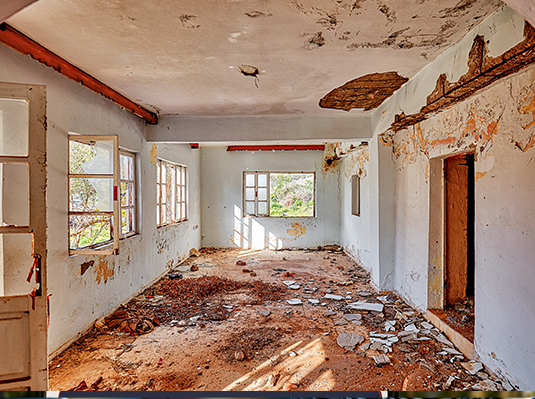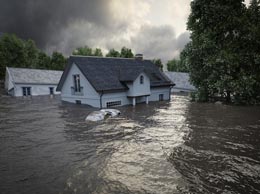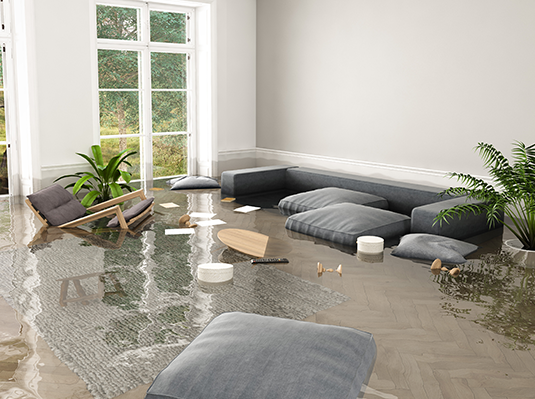
What are flood zones?
Flood zones are geographic areas that are designated by the Federal Emergency Management Agency (FEMA) to indicate how likely it is for a property to experience flooding. FEMA will categorize every home into one of several varying flood zones. Homes located in zones designated by the letters B, C, and X are considered low- to moderate-risk, while homes designated by the letters A and V are high-risk zones. Looking at the flood zone that a home is located in is the easiest way to get a basic reading on how likely a home is to flood based on past flooding conditions. Typically, people who own homes in an A or V flood zone will be required by their mortgage company to maintain a current flood insurance policy, while people who own homes in low or moderate flood zones have the choice to get flood insurance or remain uninsured if they prefer.
How do I determine what my flood zone is?
The FEMA Flood Map Service Center (MSC) is the official online location for all flood hazard mapping products created under the National Flood Insurance Program, including your community’s flood map. Go to FEMA’s website to view and obtain your flood map.
What factors go into determining flood zones?
FEMA looks at several physical and geographical factors when determining the flood zone of a home. First, they look at the proximity to major bodies of water, including rivers, lakes, and, of course, the ocean. Homes that are located close to large water sources are typically more likely to flood compared to their landlocked counterparts. After looking at a physical location, FEMA considers things like local climate patterns, elevation, and soil absorption rates. After researching and obtaining regional data, FEMA can narrow each property down to a certain rating and assign a zone.
Should I have flood insurance?
Flood insurance is a specific insurance coverage that protects your home and personal property against damage caused by flooding. Unlike standard homeowners' policies, flood insurance covers losses directly caused by flooding. This is critical because just one inch of floodwater can cause over $25,000 in damage.
While it may not seem like it, every single property in this country is in some level of flood zone. Whether the risk is low or high, there is a possibility that any home can flood. If you own a home in a high-risk flood zone, most insurance professionals will agree that you need to have flood insurance. In most cases, this will be a requirement if you have a mortgage. For homeowners located in low- or moderate-risk zones, the decision can be a little tougher. Some will base this decision on factors such as the frequency of flooding in the area or the elevation of the land around them.
The best thing to do is to get a quote from an insurance agent to see the cost of the policy. In most cases, flood insurance will cost less than $600 per year for a home in a low- or moderate-risk flood zone. At this price, it’s nearly always worth having a flood insurance policy to protect your home from a disaster that could potentially cause tens of thousands of dollars in damage.
Can flood zones change?
The flood zone that a home is located in today may not be the same zone it was ten years ago or the zone it will be in ten years in the future. Things like new neighborhood construction, land management, and developing infrastructure can have a big impact on the direction in which water flows and the places where it pools. FEMA will usually remap flood zones once every 5 years to keep these records as up-to-date as possible, so it is important to check this periodically to ensure that you are still protecting your home accordingly. One of the biggest benefits to securing flood insurance for a home in a low- or moderate-risk flood zone is the fact that you can be grandfathered into a current zone to keep premiums consistent if the flood zone ever gets adjusted to a higher-risk area.
Floodwater can cause disastrous levels of damage to our homes, so we must be well informed about floods and the risks they pose to us individually. Taking the proper steps and understanding flood zones can help you avoid life-changing losses. Reach out to your agent to learn more about flood insurance and get a quote tailored for you.
The contents of this article are for informational purposes only. You should not act or refrain from acting based on this information without first consulting a Goosehead licensed agent at [email protected]. We disclaim all liability for actions taken or not taken by you based on the contents of this article, which is provided "as is." Goosehead makes no representation that this content is error-free


